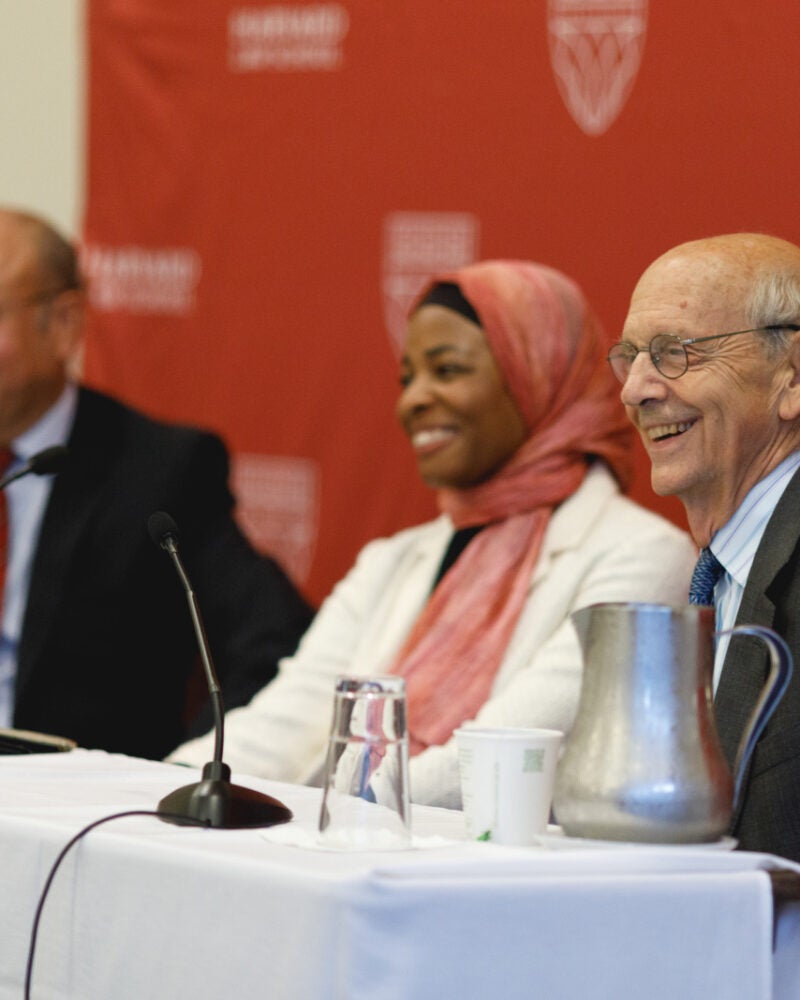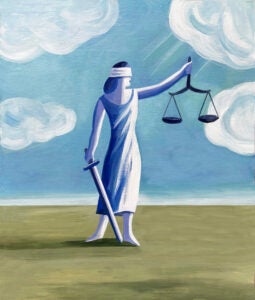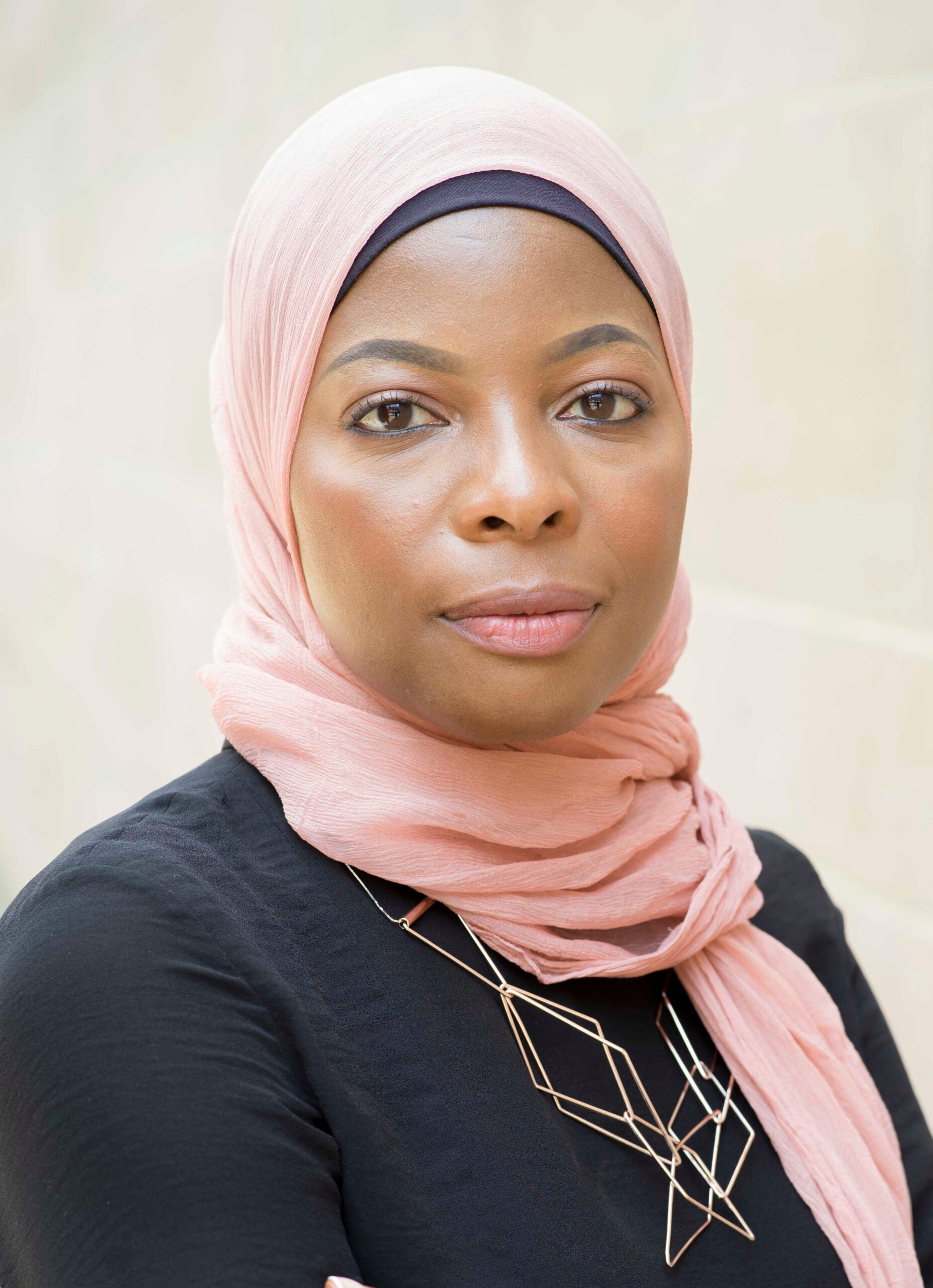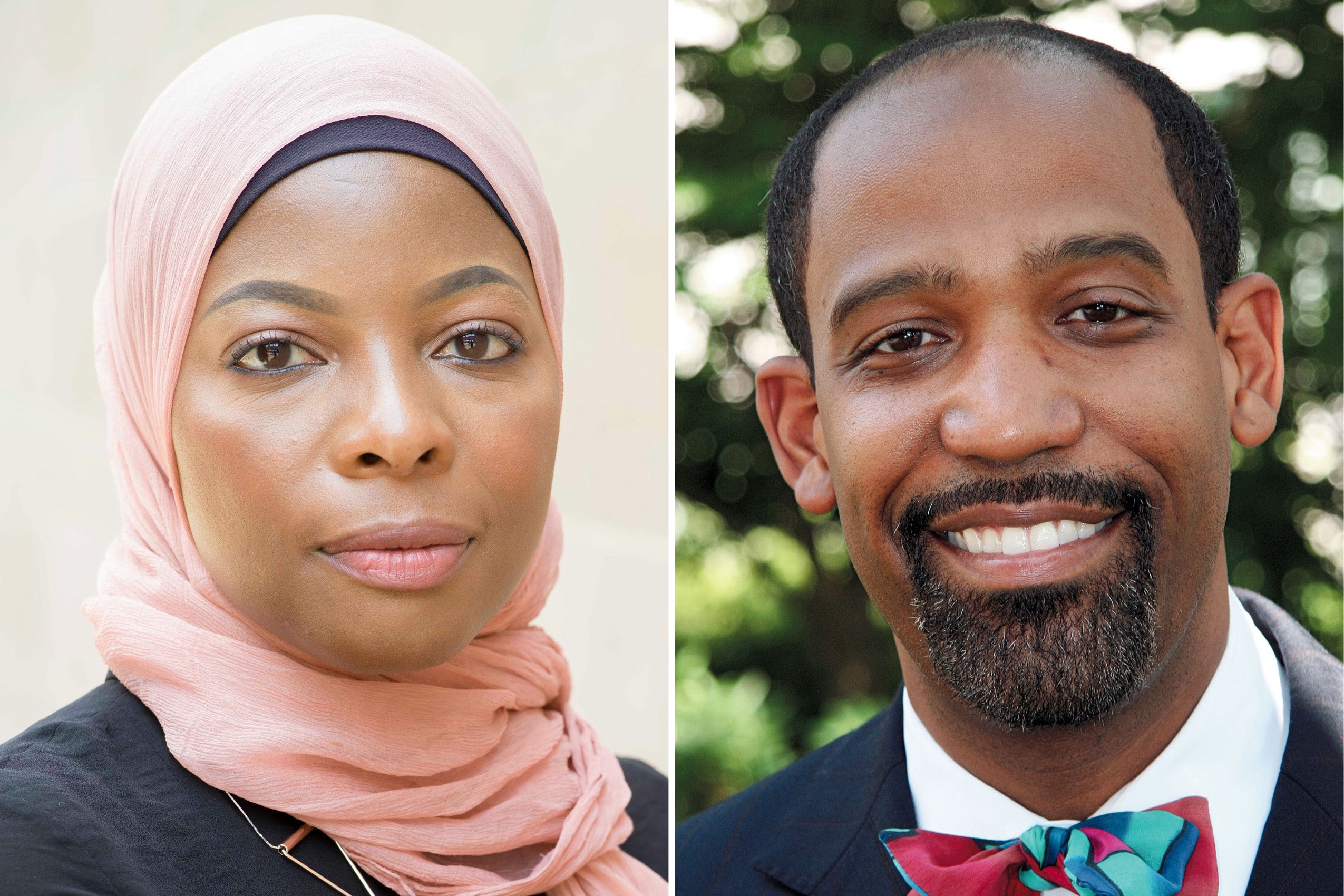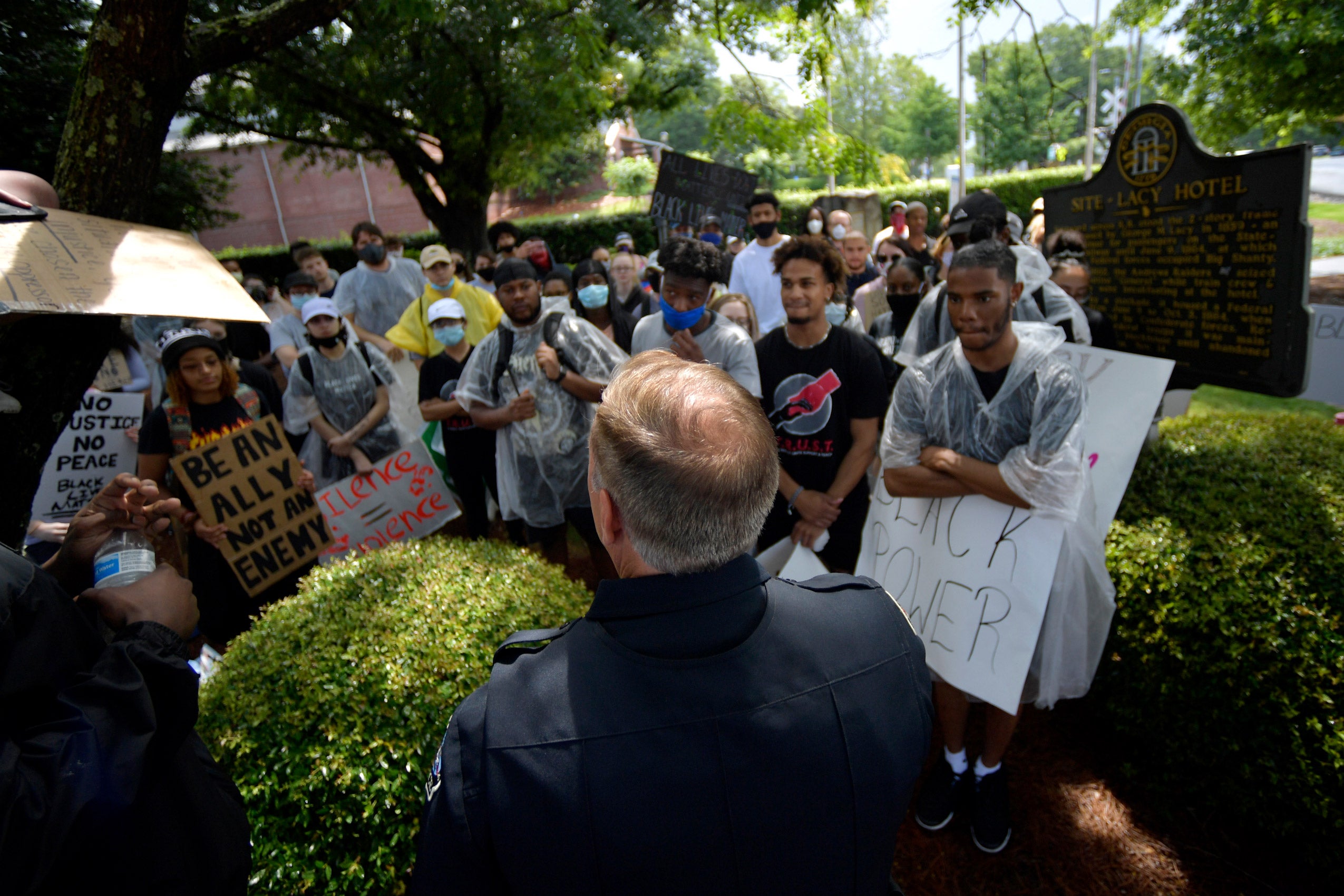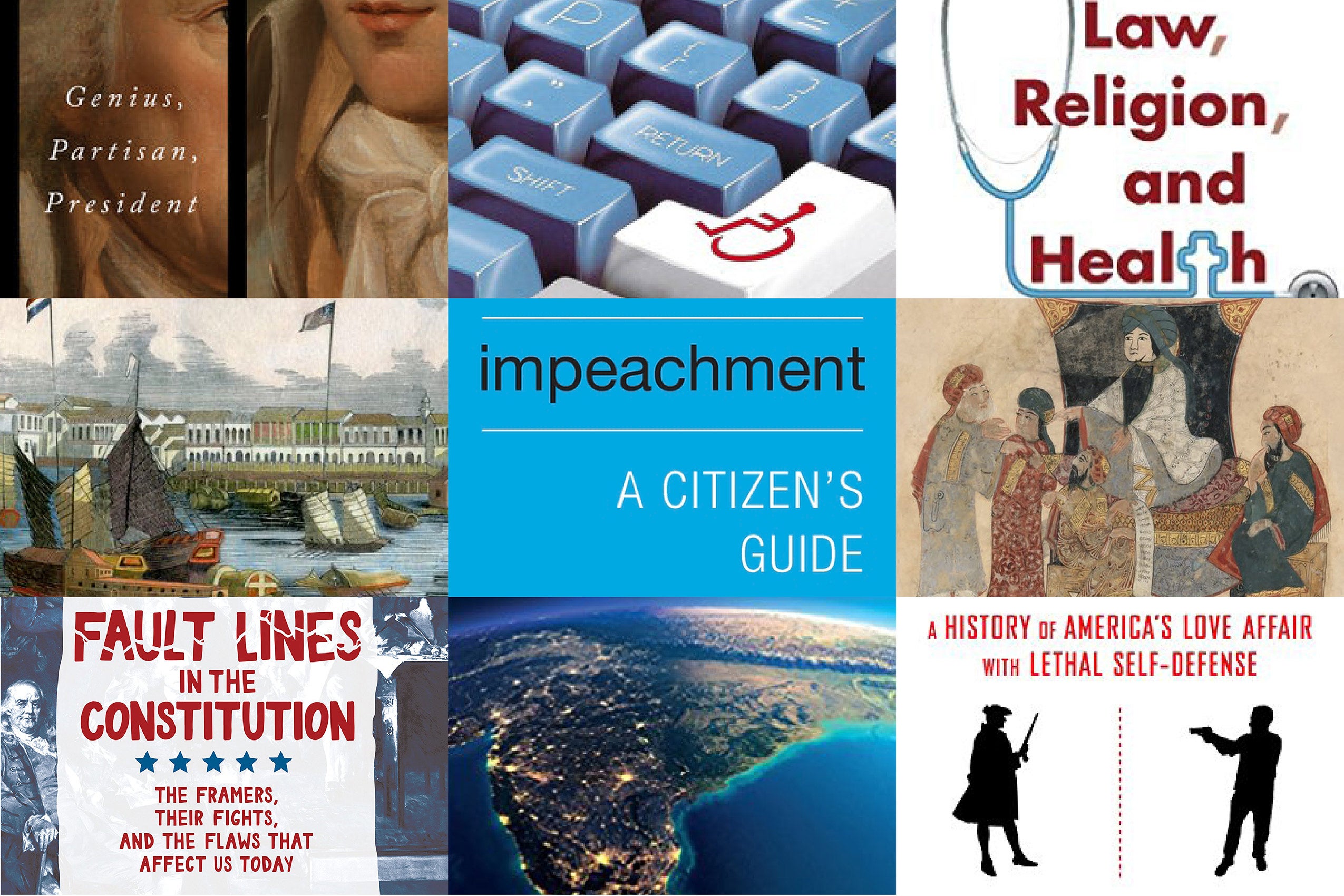People
Intisar Rabb
-
Faith in the Law
January 31, 2022
Four distinct programs pursue research and address current topics linked to the intersection of religion and law
-
Intisar Rabb has been appointed special adviser to ICC prosecutor
September 28, 2021
Professor Intisar Rabb, director of the Program in Islamic Law at Harvard Law School, was appointed as a special adviser on Islamic Law to the new chief prosecutor of the International Criminal Court.
-
Harvard beyond the Yard
September 23, 2021
Harvard Law faculty and staff reveal beloved spots for work and play at America’s oldest institution of higher learning.
-
HLS professors win case for former Buffalo police officer fired for intervening in a chokehold
April 20, 2021
In a precedent-setting case, Harvard Law School professors secure reinstatement for a Buffalo police officer fired for intervening in a chokehold.
-
Litigators of the Week: This Kirkland/Harvard Law Team Vindicated a Fired Cop Who Intervened When a Colleague Used Excessive Force
April 19, 2021
In May 2008, the Buffalo Police Department fired Cariol Horne just months shy of her pension for 20 years of service vesting after she intervened when a fellow officer applied a chokehold to an unarmed Black man. This week a litigation team led by lawyers from Kirkland + Ellis and Harvard Law School won a ruling from a state court judge in New York awarding Horne back pay and benefits that she had previously been denied in another legal challenge to her firing more than a decade ago...Ronald Sullivan: “At stake was not only Cariol’s pension and her ability to support herself, but also the message being sent to other officers. She fulfilled her duty to protect and serve, but her first trip to court in 2010, where the court confirmed her termination, created a chilling effect on an officer’s duty to intervene. Despite what the official policy was, a court decision that terminated a fellow officer and denied her a pension did not encourage officers to follow Cariol’s lead—even though her behavior is what the nation was calling for and requiring.” ... Intisar Rabb: “Cariol presented a model for what we the people expect police officers to do when another officer is using excessive force against an unarmed civilian: She intervened to save a life and was punished for it. We thought it imperative that she get not only her pension, but that our laws are correct that led to the injustice of her losing it.”
-
At Harvard, a growing focus on Islamic law
April 14, 2021
Professor Intisar Rabb, who recently organized leading scholars on Islamic law for a roundtable on Islamic legal history and historiography, says that the time is right for a fresh look at the growing area of Islamic Law scholarship.
-
Going remote
March 3, 2021
Ten Harvard Law School faculty share a behind-the-scenes look at their Zoom studios and the innovative approaches they employed to connect with students.
-
Cariol Holloman-Horne's legal team made the first step Wednesday toward a new lawsuit over her firing 12 years ago from the Buffalo Police Department. Her attorneys filed in State Supreme Court in Buffalo paperwork seeking an index number assigned to her old case. It is a procedural motion, but it signals the start of a new legal fight to have her firing overturned and to get a full police pension. Horne was fired in 2008 following an arbitration hearing. She was accused of attacking a fellow officer as he was trying to arrest a man during a domestic dispute on Nov. 1, 2006. Horne said then and has maintained over the years that she was trying to stop the officer from choking the man. At the time, she had 19 years on the job, which meant she was one year shy of the 20 years required to receive a full police pension upon retirement. That meant she would have to wait until she was 55 to retire and receive a partial pension from the state. This is not Horne's first attempt to have her case overturned. Several months after she was fired, she sued to be reinstated, but then-State Supreme Court Justice Joseph Makowski ruled against her on several procedural matters. Horne's case took on renewed interest after the officer she had fought, Greg Kwiatkowski, pleaded guilty to a misdemeanor charge in an unrelated federal police brutality case. Kwiatkowski, who testified against two other officers who were acquitted in that case, waws sentenced to four months in prison. The uproar earlier this year over the video-recorded death of George Floyd, who suffocated under the knee of a Minneapolis police officer while three others officers stood nearby, also drew new attention to Horne's firing. Horne is represented by a legal team led by Ronald Sullivan and Intisar Rabb of Harvard Law School. Sullivan and his team represented the family of Michael Brown, a Black teenager whose shooting death by a white police officer in Ferguson, Mo., sparked protests there in 2014. The attorneys were not available for comment Wednesday.
-
Fired officer’s long quest for vindication: ‘Cariol did what those officers didn’t do’
September 8, 2020
For 14 years, Cariol Holloman-Horne has held firm that she did the right thing when she tried to stop a fellow Buffalo cop who she says was choking a man he was trying to arrest. Horne lost her job and also her full police pension. She's worked odd jobs, mostly recently as a truck driver. At times, she has lived out of her car. She tried numerous times and through numerous avenues to try to get her pension and also pass laws to require police to intervene when another one is going too far...The cellphone video of George Floyd dying under the knee of a Minneapolis police officer set off a firestorm of outrage, not just at Derek Chauvin but also the three other police officers who are seen standing by and doing nothing to stop Chauvin. Suddenly, Horne’s story has new resonance...Horne recently gained powerful new allies: She is represented by a legal team that includes Ronald Sullivan and Intisar Rabb of Harvard Law School. Sullivan and his team represented the family of Michael Brown, a Black teenager whose shooting death by a white police officer in Ferguson, Mo., sparked unrest there in 2014. “Honored to now represent @CariolHorne – former Buffalo police officer terminated after she intervened when a fellow officer employed a chokehold against an unarmed black man,” he tweeted July 10. The Common Council appears poised to enact at least part of Horne's proposal by making the duty to intervene a law and not just a police department policy, as it is now.
-
HLS professors and other associates condemn President Trump’s statements about recent protests
June 7, 2020
In an open letter to the community, Harvard Law School professors and other associates condemn President Trump’s statements about recent protests
-
How can law students help in the midst of COVID-19?
April 29, 2020
Lee Mestre helped to coordinate Harvard Law School student aid efforts after natural disasters in New Orleans and Puerto Rico. Now she's using that experience to help law students support people in Massachusetts affected by the COVID-19 crisis.
-
On the Bookshelf: HLS Authors
December 11, 2019
This fall, the Harvard Law School Library hosted a series of book talks by Harvard Law School authors on topics ranging from forgiveness in law, transparency in health and fidelity in constitutional practice.
-
Law’s Influencers
February 26, 2019
HLS faculty blogs on law-related topics are reaching thousands—sometimes millions—and have become required reading for experts.
-
Roughly two dozen Harvard Law School professors have signed a New York Times editorial arguing that the United States Senate should not confirm Judge Brett M. Kavanaugh as an Associate Justice of the Supreme Court. Harvard affiliates — including former Law School Dean Martha L. Minow and Laurence Tribe — joined more than 1,000 law professors across the country in signing the editorial, published online Wednesday. The professors wrote that Kavanaugh displayed a lack of “impartiality and judicial temperament requisite to sit on the highest court of our land” in the heated testimony he gave during a nationally televised hearing held Sept. 27 in front of the Senate Judiciary Committee....As of late Wednesday, the letter had been signed by the following: Sabi Ardalan, Christopher T. Bavitz, Elizabeth Bartholet, Christine Desan, Susan H. Farbstein, Nancy Gertner, Robert Greenwald, Michael Gregory, Janet Halley, Jon Hanson, Adriaan Lanni, Bruce H. Mann, Frank Michelman, Martha Minow, Robert H. Mnookin, Intisar Rabb, Daphna Renan, David L. Shapiro, Joseph William Singer, Carol S. Steiker, Matthew C. Stephenson, Laurence Tribe, Lucie White, Alex Whiting, Jonathan Zittrain
-
More than 500 people attended the Massachusetts Black Lawyers Association’s 45th Anniversary Gala at the Boston Park Plaza. Desiree Ralls-Morrison, executive vice president, general counsel and corporate secretary at Boston Scientific, was the keynote speaker. Awards were presented to Melvin Miller, Intisar Rabb, Keith N. Hylton, Maria O’Brien Hylton, Ralls-Morrison, Jonathan L. Allen, Jalessa L. Almonacy, Courtney M. Person and Stephanie N. Johnson.
-
On the Bookshelf: HLS Authors
December 14, 2017
This fall, the Harvard Law School Library hosted a series of book talks by HLS authors, with topics ranging from Justice and Leadership in Early Islamic Courts to a Citizen's Guide to Impeachment. As part of this ongoing series, faculty authors from various disciplines shared their research and discussed their recently published books.
-
‘Anti-Sharia’ rallies brought out pro-Trump thugs — internet radicalized and spoiling for violence
June 12, 2017
Alt-right events are harvests of hate. They draw militants seeded by Donald Trump, fertilized in the muck of the internet, and nurtured by the more than 900 hate groups around the United States. Take the “March against Sharia” on June 10. It was organized by ACT for America, described by the Southern Poverty Law Center as an anti-Muslim extremist group. It planned more than 20 events around the country, and according to media accounts most rallies drew a few dozen at most...Speakers and attendees obsessed over women’s sexuality, conflating Sharia with honor killings, female genital mutilation, child marriage, and pedophilia. In actuality, the use of Sharia ranges widely in Muslim-majority countries and usually applies only to family and inheritance law, according to Intisar Rabb, a legal scholar. She says under the U.S. system of jurisprudence, “there is no threat that Sharia, or any other religious law, will supersede the laws of the state.”
-
As the United States continues to grapple with growing Islamophobia, Harvard Law School has launched a “flagship research venture” to organise the world’s information on Islamic law: SHARIAsource. The project aims to provide a repository for scholars, journalists and policy makers, by making knowledge freely available, Sharon Tai, SHARIAsource’s research editor, told Middle East Eye...“Islamic law is so often seen as an esoteric and impenetrable base of law. There’s this kind of perception of a lack of logic, because it’s based in theology,” Tai continued, “but actually there is a very clear logic behind it. The way it’s laid out historically, it worked well for the societies in which it was applied.” The project was conceived nearly a decade ago, by Dr Intisar Rabb, Professor of Law at Harvard Law School and a director of its Islamic Legal Studies Programme.

